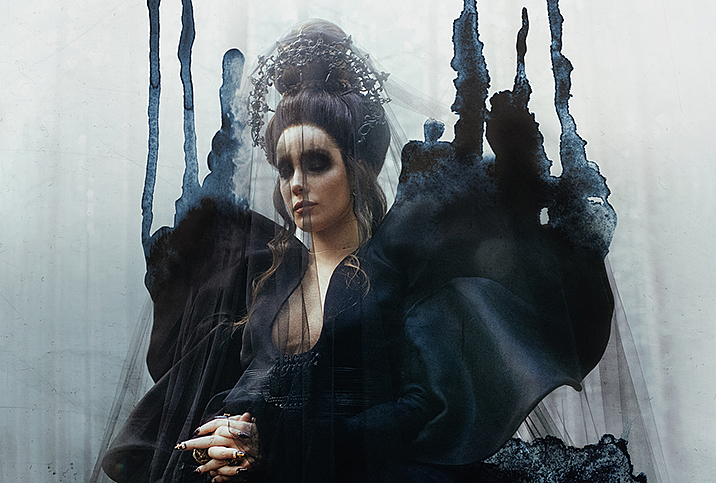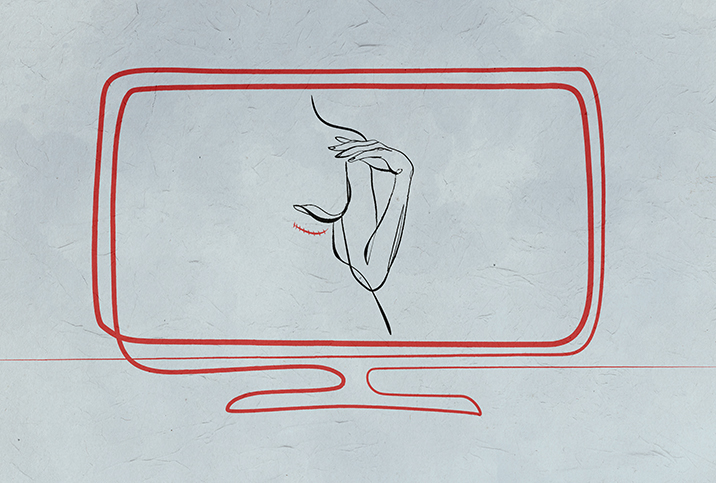Halsey's New Film Examines the Complexities of Motherhood

Halsey's haunting film "If I Can't Have Love, I Want Power," a companion piece to the singer's fourth studio album (under the same name), is a powerful and dramatic rumination on motherhood, gender identity, sexuality and socioeconomics. The 50-minute movie, available on HBO Max, is an accomplishment—an intimate, cinematic narrative forming a story around the album's soundtrack.
The film opens on Queen Lila, portrayed by Halsey, dressed in all white. The king is lying dead on the floor while his royal court looks on, horrified and distrustful of Lila, who they suspect killed him. Lila looks beyond the men to a mirror in which she sees Lilith (a demonic, feminist figure in Jewish folklore), whose movements mirror her own.
At the funeral scene, the nobility stare daggers at Queen Lila, who lifts her sleeve and shows them a large bruise—the scene flashes back to the king abusing her as Halsey's lyrics "I won't die for love" play in the background. That night, the queen sensually writhes in bed, nearly naked and free from the gaze of others, as Lillith joins her. What at first seems erotic turns evil as Lilith stabs Lila's belly.
Lila awakes the next morning to find she is pregnant, with the lyrics "I've been corrupted" playing. "The more that you give away / The more that you have / The more that they take."
It's a strikingly honest look at the early moments of pregnancy. While media has traditionally portrayed the smiles, the cheers, the tearful announcements of a woman finding out she is with child, "If I Can't Have Love, I Want Power" plays it for gestational terror. In an Instagram post, Halsey said this album would examine "the joys and horrors of pregnancy," and you can see these themes throughout.
The film flashes through each month of pregnancy, every scene showing Queen Lila despondent, sick and jealous of her nonpregnant friends. It's not until month seven that Lila smiles at her growing belly.
When the royal court formally accuses Lila of killing the king, ordering her death as soon as she gives birth, the camera focuses on the queen's face as she feels the weight of her situation, her place as a woman in the world she inhabits. She is a carrier of life, her own existence worth nothing.
A nobleman says, "I see a filthy child dressed up in the trappings of a title into which she was not born." One can't help but wonder how much of Halsey's own upbringing influenced this theme of belonging. Halsey has been open about the instability in which she grew up. Moving households, financial hardship and drug use littered her young life. Later lyrics echo the sentiment: "Never knew the feeling of a stable home / Been a couple years of living on the road / Couldn't really tell you where they'd leave a stone / To visit me when I am dead and gone."
Queen Lila escapes the castle and finds refuge in a witch's shack where she gives birth, the scene cutting between labor, her husband's abuse and his death. Her baby is born and the lyrics "Losing you is easier than lying to myself that you love me" play on repeat. The noblemen take the baby and place the queen in jail.
Pregnancy is beauty and horror—and Halsey understands just how to portray that strange dichotomy.
The guillotine is readied as the queen stands in black, holding her baby, the singer's powerful lyrics "I am not a woman / I'm a god" playing in the background—the words extracting motherhood from femininity: She is a god who created life separate from the identity of "woman." Halsey's personal experience with pregnancy influenced their own feelings on gender identity, publicly changing their pronouns to she/they.
In an Instagram post, the singer wrote, "I thought pregnancy would give me very strong, binary feelings about 'womanhood,' but truly it has leveled my perception of gender entirely. My sensitivity to my body has made me hyperaware of my humanness and that's all."
The movie closes with Lila's head on the chopping block, flashing to an alternate version of the queen playing and laughing with her child as they grow up. (Notably, the film never reveals the child's gender.) Back to the guillotine, the ax is swung, and the queen is beheaded. Lilith stands in the crowd, adorned in red and gold, watching.
It's a haunting final image. Queen Lila is reborn as Lilith, no longer trapped in a body she couldn't recognize, a body taken over by a child she loved. She has shed her earthly constraints and realized her own power.
Pregnancy is beauty and horror—and Halsey understands just how to portray that strange dichotomy in the movie "If I Can't Have Love, I Want Power."


















